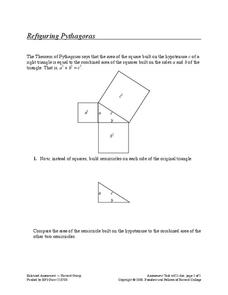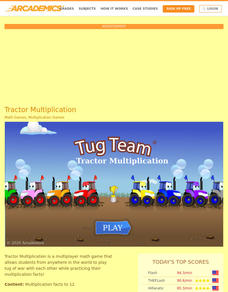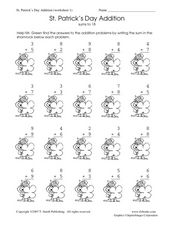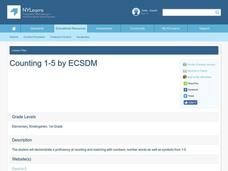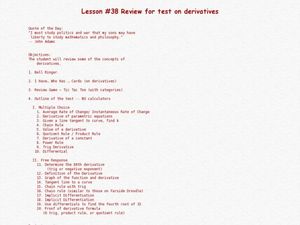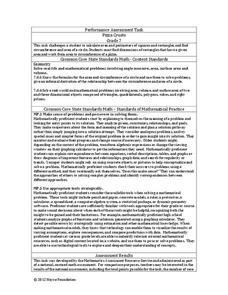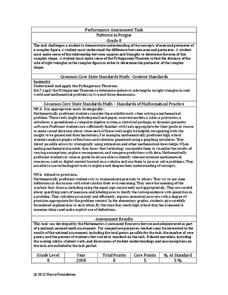West Contra Costa Unified School District
Simplifying Fractions Activity
Warm-up pupils' fraction muscles with a four-question quiz, then delve into a learning game designed to reinforce the concept of simplifying fractions. Based on the "I do, We do, You do" method of teaching, the instructional...
Balanced Assessment
Refiguring Pythagoras
Why was Pythagoras so obsessed with squares? The assessment task posits the question of whether the geometric interpretation of the Pythagorean Theorem holds for figures other than squares. Scholars first consider the case of semicircles...
Arcademics
Tractor Multiplication
Use multiplication to help win a game of tug-of-war. An online game helps learners reinforce their multiplication facts. Selecting the correct answers to multiplication problems helps move a tractor in a tractor tug-of-war in their favor.
Curated OER
Living on Your Own -- Let's Calculate the Cost!
Students review basic math skills, such as addition, subtraction, multiplication, division, finding averages, and working with percentages. They see how these skills apply to real life situations.
Curated OER
Introduction to Hours & Minutes
First graders identify, interpret, and gain proficiency in using a clock to tell time to the hour and determine how many minutes are in an hour. They identify and list what they do as they travel through their dayand how much time you...
T. Smith Publishing
Saint Patrick's Day Addition Worksheet 1
Simple, single-digit addition problems fill this assignment. With a St. Patrick's Day theme, individuals write the correct answers in the shamrocks below each problem. With a little luck o' the Irish and the practice that this provides,...
Curated OER
Counting 1-5
Students explore numbers by participating in basic counting activities. In this early math lesson, students identify the numbers between 1 and 5 and read several books that demonstrate early counting. Students practice counting to 5 on...
Curated OER
Real Life Algebra
Students investigate where in their everyday life math is used. In this algebra instructional activity, students describe linear transformation as it relates to business and sales. They relate area and perimeter to their yard or garden,...
Curated OER
Buggin' Out (Identifying and Adding Amounts of Money)
Learners explore consumer math by participating in estimate exercises. In this currency lesson, students identify and define each piece of U.S. currency and their value to the monetary system. Learners complete several money worksheets...
Curated OER
Relationship Between Addition and Subtraction
Students are taught how to add and subtract and use number sense to solve basic math problems. For this addition and subtraction lesson, students are being taught using theories from different philosophers in education. They are given a...
Curated OER
Response to Intervention Can Help Students Struggling in Math
How to help your students who are struggling in mathematics before they fall too far behind.
Curated OER
NJ HSPA Cluster 4
Pupils engage in a lesson that is focused upon helping them to complete exercises used to prepare for the High School Proficiency Assessment. They look at the patterns seen in algebraic problems and focus upon the cluster areas of...
Curated OER
New York State Testing Program: Book 1 grade 7
In this seventh grade mathematics worksheet, 7th graders are provided with problems of a similar nature to those on the state proficiency examination. The twenty-four page worksheet contains thirty multiple choice questions. ...
Curated OER
Review for Test on Derivatives.
Students review derivatives and equations for their test. In this calculus lesson plan, students review average rate, parametric equations, tangent line to a curve and value of a derivative to prepare and show mastery on a chapter test....
Noyce Foundation
Time to Get Clean
It's assessment time! Determine your young mathematicians' understanding of elapsed time with this brief, five-question quiz.
Noyce Foundation
Pizza Crusts
Enough stuffed crust to go around. Pupils calculate the area and perimeter of a variety of pizza shapes, including rectangular and circular. Individuals design rectangular pizzas with a given area to maximize the amount of crust and do...
Noyce Foundation
Ducklings
The class gets their mean and median all in a row with an assessment task that uses a population of ducklings to work with data displays and measures of central tendency. Pupils create a frequency chart and calculate the mean and median....
Inside Mathematics
Archery
Put the better archer in a box. The performance task has pupils compare the performance of two archers using box-and-whisker plots. The resource includes sample responses that are useful in comparing individuals' work to others.
Inside Mathematics
Rhombuses
Just what does it take to show two rhombuses are similar? The assessment task asks pupils to develop an argument to show that given quadrilaterals are rhombuses. Class members also use their knowledge of similar triangles to show two...
Inside Mathematics
Graphs (2006)
When told to describe a line, do your pupils list its color, length, and which side is high or low? Use a worksheet that engages scholars to properly label line graphs. It then requests two applied reasoning answers.
Noyce Foundation
Parallelogram
Parallelograms are pairs of triangles all the way around. Pupils measure to determine the area and perimeter of a parallelogram. They then find the area of the tirangles formed by drawing a diagonal of the parallelogram and compare their...
Noyce Foundation
Sewing
Sew up your unit on operations with decimals using this assessment task. Young mathematicians use given rules to determine the amount of fabric they need to sew a pair of pants. They must also fill in a partially complete bill for...
Inside Mathematics
Patterns in Prague
Designers in Prague are not diagonally challenged. The mini-assessment provides a complex pattern made from blocks. Individuals use the pattern to find the area and perimeter of the design. To find the perimeter, they use the Pythagorean...
Inside Mathematics
Quadratic (2009)
Functions require an input in order to get an output, which explains why the answer always has at least two parts. After only three multi-part questions, the teacher can analyze pupils' strengths and weaknesses when it comes to...



